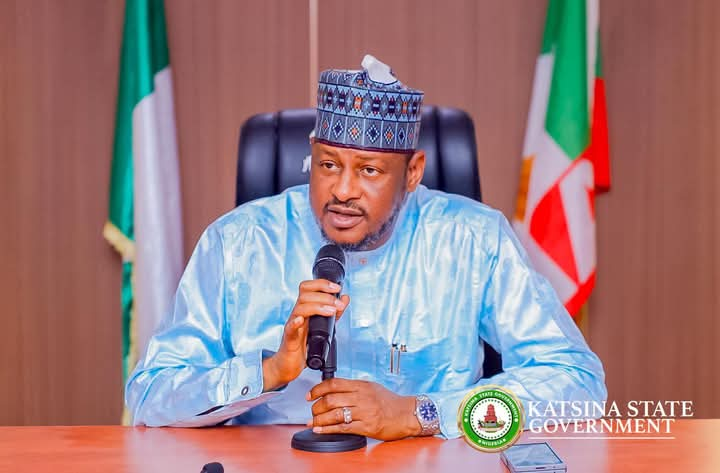University Don Commends Governor Radda Transformative Leadership

By 2027 at least 60% of Katsina youth will be digitally literate - Prof. Isa
The Katsina State Government has been commended for its transformative leadership and the remarkable progress under Governor Dikko Umaru Radda over the past two years.
Speaking at a special public lecture organized by the Coalition of Academics for Katsina State Development in Katsina, Professor Muhammad Kabir Isa, Dean of the Faculty of Administration at Ahmadu Bello University, Zaria, presented the assessment of the administration's achievements which brings dividends of democracy to residents of Katsina.
The event, which commemorated the second anniversary of Governor Radda's administration, brought together academics, public officials, and development practitioners to evaluate the state's governance progress under the theme "Planning as a Panacea for Good Governance: The Dikko Radda Administration in Two Years."
Professor Isa emphasized that "the administration's strength lies in its planning culture—driven by data, strategic vision, and community input."
The University Don added that "effective leadership is not trial-and-error, but the result of deliberate, informed choices."
Professor Isa also explained that "since May 2023, Governor Radda administration has consistently prioritized competence, citizen welfare, and institutional reform," asserting that "governance anchored in strategic planning naturally yields results that are both sustainable and inclusive."
In the education sector, Professor Isa stressed that "no meaningful development occurs without deliberate investment in human capital. The state's quiet revolution in education offers a compelling example of evidence-based governance in action."
The Professor revealed that an impressive 75 new secondary schools have been constructed across the state, including 15 strategically located Mega Schools in urban and semi-urban centers. He noted that these institutions "are not ordinary buildings—they include modern science labs, ICT suites, perimeter security, and dormitories."
Professor Isa further clarified that the placement of these schools was not politically motivated but based on geospatial gap analysis—targeting communities that had previously been neglected.
Through the transformative AGILE programme, Professor Isa reported that more than 100,000 girls now have access to secondary education, with the government covering tuition, transportation, uniforms, and hygiene materials.
"This initiative has drastically reduced the dropout rate in rural areas," he added.
The Professor shared that 7,325 teachers were recruited and strategically deployed based on a teacher-gap index, insisting that "this wasn't a political exercise but a rational distribution informed by data—placing the right teachers where they are most needed."
Additionally, Governor Radda led administration is also constructing Smart Secondary Schools across the three senatorial district to ensure access to quality education by children with special needs and those from humble backgrounds.
In higher education, Professor Isa disclosed that over N640 million has been distributed in bursaries to students in tertiary institutions.
On the healthcare development initiative, Professor Isa added that 41 Katsina students have been sponsored to study medicine abroad.
He reported the launch of the Smart Classroom Pilot Programme, featuring digital whiteboards, tablets, and e-learning tools. He also projected that by 2027, at least 60% of Katsina youths aged 16–30 will be digitally literate—a forward-thinking goal that aligns with global trends.
Addressing the healthcare sector, Professor Isa emphasized that when Governor Dikko Umaru Radda assumed office, he did not merely inherit a government—he inherited a broken health system in urgent need of revival.
He reaffirmed the Governor's belief that a healthy population is not a luxury, but the bedrock of every serious developmental effort.
The Professor stressed that over 30 Primary Healthcare Centres (PHCs) have already been upgraded into full-fledged Community Health Centres.
"These facilities now run on solar energy, stock essential drugs, and are staffed with trained health professionals," he declared.
In furtherance to this, Professor Isa outlined the launch of the Katsina Micro Health Insurance Scheme (KMHIS) in 2024, describing it as a landmark programme offering subsidized healthcare coverage to low-income households, informal sector workers, and rural dwellers.
He announced the launch of the Future Doctors Scholarship Programme and revealed that the 2025 capital budget includes plans for a State College of Nursing and Midwifery.
Speaking on agricultural revolution and economic transformation, Professor Isa acknowledged that over 80% of its population depends directly on agriculture for their livelihoods.
Professor Isa emphasized that the Radda administration understands that "prosperity must begin with the farmer."
He particularly quoted Governor Radda as often saying: "We cannot build the future of agriculture with cutlasses and hoes."
The Professor highlighted the widespread mechanization programme, explaining how the state procured and distributed hundreds of tractors and harrows—not as handouts, but under cooperative-based leasing schemes.
He commended the introduction of the Katsina Farmer Registration and Verification System (K-FARMS), noting that "the system removes ghost beneficiaries from the equation and targets real farmers who actually till the land."
Professor Isa described the introduction of solar-powered irrigation systems in over 60 farming clusters as "a quiet revolution that starts with water and ends in wealth."
In his concluding remarks, Professor Isa reiterated that "what Katsina State demonstrates is not merely good governance, but a governance culture rooted in planning, foresight, and accountability." He
He, however, called on "other sub-national governments to study Katsina's model and adapt similar strategies rooted in context and data."
"Democracy must deliver. And for it to do so, leaders must lead with vision, with discipline, and above all, with a sincere commitment to the people they serve," the Professor declared.

